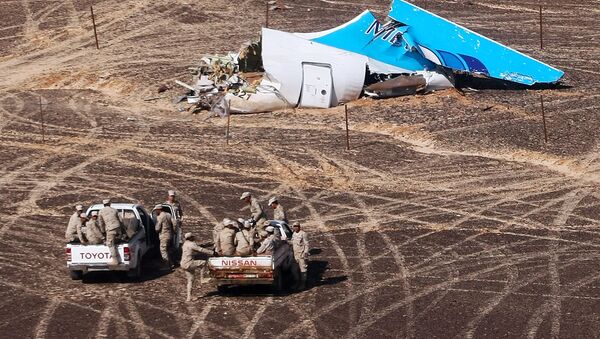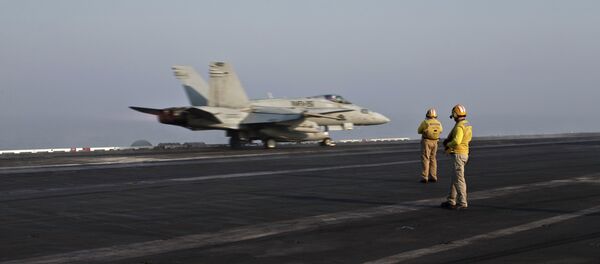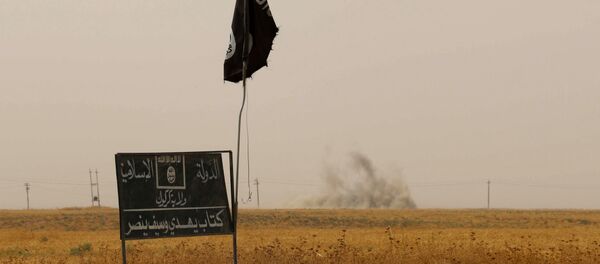The magazine's analysis, published as an editorial in its Monday print edition, suggests that "if the version suggesting terrorism is definitively confirmed (and the facts in favor of this theory are mounting), first and foremost it will be necessary to understand what forces may stand behind the direct perpetrators from among the Egyptian wing of the Islamic State."
"The first version," Expert notes, "is that Qatar, a country which supports ISIL, may be responsible. The emirate does have a very tense relationship with Moscow, and the parties regularly exchange insults and threats, including over Syria. Moscow's actions there are contrary to the interests of Qatar's powerful Minister of Foreign Affairs –Khalid bin Mohammad Al Attiyah, and undermine his authority in his own country."
"However," according to the magazine, "in this case, it appears unlikely to be the work of the emirate. The days of the emirate's disproportionate ambitions sank into oblivion along with the former emir, and now the ultimate goal of Qatar's authorities seems to be to maneuver between Iran and Saudi Arabia. It seems unlikely that the emirate would risk the consequences of blowing up a Russian plane."
"The Saudis on the other hand, have had every reason to lash out at the Kremlin," Expert notes. "Having begun an operation in Syria and managing to coordinate it with the Americans, Moscow did not just muddle all of Riyadh's cards in the Syrian war — it put Saudi Arabia in a desperate situation."
Expert admits that "this version has one major drawback: ISIL is not a Saudi project. However, the Middle East knows many examples of effective cooperation between the Kingdom and the self-declared caliphate. For example, in Yemen, the Saudis are fighting against pro-Iranian Huthis hand in hand with the local branch of ISIL –Al-Qaeda in the Arabian Peninsula."
"If it turns out that Saudi Arabia really is behind the attack on the Russian plane, Russia will have a number of options at its disposal. The first and most obvious is to begin an open military conflict with Riyadh; this is the most unreasonable option. The Americans have the Saudis' back, and are destined to support the Kingdom [in the event of war]. As a result, Moscow would not only be unable to achieve its goals, but also risk destroying a shaky compromise with Washington on Syria."
"But there is another possibility," Expert suggests, "via the Houthis. And Russia would not even have to supply them with weapons (the Iranians have already successfully done so). It would be enough simply to provide them with political support, and to protect them from possible sanctions."
In his own analysis of the crash, published in online analysis resource Svobodnaya Pressa, Yevgeny Satanovsky, a well-known Middle East expert, respectfully disagreed with Expert's analysis, suggesting that it the "Qatari trace which must be sought in the tragedy on the Sinai."
Noting that Foreign Minister Al Attiyah "actually runs the emirate today," the analyst explained that "the war in Syria is treated by the foreign minister as a business. Al Attiyah has invested billions of dollars into this business, and if the plan to overthrow Bashar Assad fails, he stands to lose his position among Qatar's ruling elite."
"Specifically," Satanovsky explained, "Al Attiyah is the sponsor of a number of terrorist groups in Syria which have been bombed by Russian military aircraft. Yes, even the infamous Islamic State is largely a toy of the Qataris. Moreover, it is Qatar which funds all the terrorism in the Sinai Peninsula. It's simply worth recalling Qatar's use of the Muslim Brotherhood to undermine the Egyptian government, and the Brotherhood's defeat by Egyptian authorities in 2013."
In the case of the downed Russian Airbus, Satanovsky noted that "in my opinion, we really are dealing with a terrorist attack, one which could be easily organized by the Qataris. In the place of the security services, I would attempt to sniff out the Qatari trace in the airport at Sharm el-Sheikh. And if traces of explosives are found on the wreckage of the airliner, it will be necessary to look in the direction of Minister Al Attiyah, and those terrorist groups in Sinai which he finances and organizes."
Ultimately, the expert suggests that if it is a terror attack, it is worth noting that this is exactly how the Qataris would target Russia. "Organizing terrorist attacks in Russia is not their forte –but rather that of the Saudis' General Intelligence service, so long as the latter was led by Prince Bandar bin Sultan [who was dismissed April 2014]. Now the Saudis have quieted down, and have their own, separate interests in Egypt. Therefore, I have no reason to suspect their involvement in the Airbus crash."
In any case, if the theory that the Russian plane was downed by a terror attack turns out to be true, and the trace does lead to any third power, rest assured that there will be hell to pay for those responsible.






